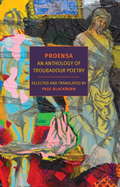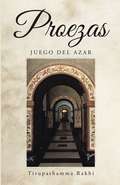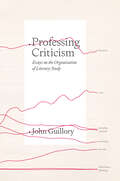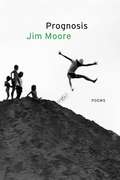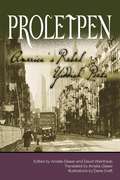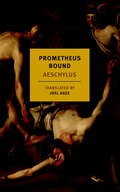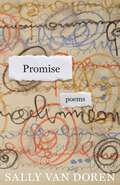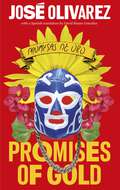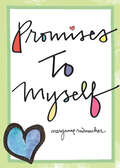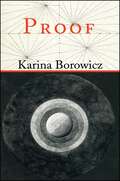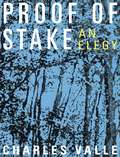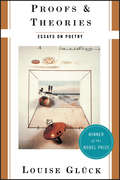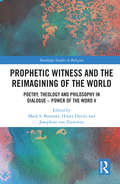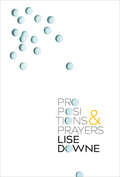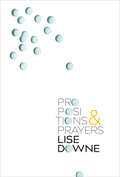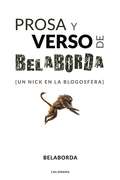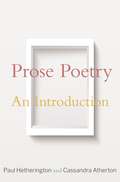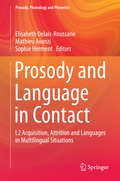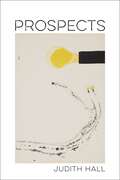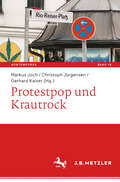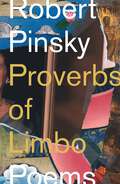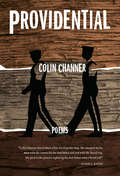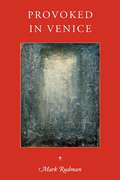- Table View
- List View
Proensa: An Anthology of Troubadour Poetry
by Paul Blackburn George EconomouIt was out of medieval Provence--Proensa--that the ethos of courtly love emerged, and it was in the poetry of the Provençal troubadours that it found its perfect expression. Their poetry was also a central inspiration for Dante and his Italian contemporaries, propagators of the modern vernacular lyric, and seven centuries later it was no less important to the modernist Ezra Pound. These poems, a source to which poetry has returned again and again in search of renewal, are subtle, startling, earthy, erotic, and supremely musical.The poet Paul Blackburn studied and translated the troubadours for twenty years, and the result of that long commitment is Proensa, an anthology of thirty poets of the eleventh through thirteenth centuries, which has since established itself not only as a powerful and faithful work of translation but as a work of poetry in its own right. Blackburn's Proensa, George Economou writes, "will take its place among Gavin Douglas' Aeneid, Golding's Metamorphoses, the Homer of Chapman, Pope, and Lattimore, Waley's Japanese, and Pound's Chinese, Italian, and Old English."
Proezas: Juego del azar
by Tirupathamma RakhiLa compilación de cosechas en pensamientos, coraza de nieves por alimentar almas desordenadas y escafandras aún por ser amaestradas, no hay tiempo para el razonamiento. <P><P>Hay un sendero que empezó con dudas, miedos, terrores y escalofriantes sueños que no dejan dormir en las noches de día. Donde las historias se quedan entre páginas blancas esperando a que sean escritas, diseñando fábulas en otros parajes, copos de sangre y lluvias de bochornosas miradas. <P><P>¿Andarán las palabras en busca de un cuerpo fértil de santos o de un jardín adornado de veneno para ser absorbido por un último aliento, suspiro hechizado? Si así es, ¿Quién es la porcelana descuidada con la gala de ausencias entre perlas de hierro, barro de pétalos? ¿Quién dejará huellas en las cenizas de un fénix en enjambre? <P><P>Por qué este repentino escalofrío en la tenebrosidad de las danzas sin melodías, sacudida de confusiones, memorias de veintidós años de reflejos. La compilación de cosechas en pensamientos, coraza de nieves por alimentar almas desordenadas y escafandras aún por ser amaestradas, no hay tiempo para el razonamiento.
Professing Criticism: Essays on the Organization of Literary Study
by John GuilloryA sociological history of literary study—both as a discipline and as a profession. As the humanities in higher education struggle with a labor crisis and with declining enrollments, the travails of literary study are especially profound. No scholar has analyzed the discipline’s contradictions as authoritatively as John Guillory. In this much-anticipated new book, Guillory shows how the study of literature has been organized, both historically and in the modern era, both before and after its professionalization. The traces of this volatile history, he reveals, have solidified into permanent features of the university. Literary study continues to be troubled by the relation between discipline and profession, both in its ambivalence about the literary object and in its anxious embrace of a professionalism that betrays the discipline’s relation to its amateur precursor: criticism. In a series of timely essays, Professing Criticism offers an incisive explanation for the perennial churn in literary study, the constant revolutionizing of its methods and objects, and the permanent crisis of its professional identification. It closes with a robust outline of five key rationales for literary study, offering a credible account of the aims of the discipline and a reminder to the professoriate of what they already do, and often do well.
Prognosis: Poems
by Jim MooreJim Moore’s poems “are chips of reality, obsidian flakes of the heart and mind” (Jane Hirshfield)In his eighth collection, the celebrated poet Jim Moore looks into unrelenting darkness where moments of tenderness and awe illuminate, at times suddenly like lightning in the night, at others, more quietly, as the steady glow of streetlights in a snowstorm. These are poems of both patience and urgency, of necessary attendance and helpless exuberance in the breathing world—something rare in contemporary poetry. Written in Minneapolis amid the COVID-19 pandemic’s masked and distanced loneliness, after the police murder of George Floyd, as an empire comes to an end, Prognosis turns toward the living moment as a surprising source of abundance. Here we find instances of essential human connection animated by a saving grace that pulls us back from depression and despair. Contemplating with playful wisdom what it is to brave the later years of one’s life, Moore revels in the possibilities of joy and mourns the limits of our capacity to greet the unknown with resolve and wonder. The prognosis Moore foresees demands continued stillness, continued movement: “Also known as going home,” he writes. “Also known as getting over yourself.”
Progress on the Subject of Immensity (Mary Burritt Christiansen Poetry Series)
by Leslie Ullman&“For over thirty years now, Leslie Ullman has steadily refined a poetry of the most acute and lyrically precise mindfulness, of what one of her poems calls the &‘greater alertness.&’ This method has been forged in part by her ability to render the harsh beauties of the southwestern landscapes that have been her adopted home. More important still, however, is her almost shamanistic willingness to visit those liminal states between waking and dreaming, conventional reality and phantasm—states that sometimes offer menace, sometimes wonderment. This is all to say that Leslie Ullman is a poet of the first order, writing at the height of her very considerable powers.&”—David Wojahn, author of World Tree
Proletpen
by Amelia Glaser David WeintraubIn the original with English translation on facing pages, Glaser (Judaic studies, U. of Pennsylvania) presents Yiddish poetry written by American proletarian writers who identified politically and poetically with the American Left from the 1920s to the early 1950s. McCarthy-era political correctness drove the poets and their work from the burgeoning Yiddish canon. Annotation ©2006 Book News, Inc. , Portland, OR (booknews. com)
Prometheus Bound
by Aeschylus Joel AgeePrometheus Bound is the starkest and strangest of the classic Greek tragedies, a play in which god and man are presented as radically, irreconcilably at odds. It begins with the shock of hammer blows as the Titan Prometheus is shackled to a rock in the Caucasus. This is his punishment for giving the gift of fire to humankind and for thwarting Zeus's decision to exterminate the human race. Prometheus's pain is unceasing, but he refuses to recant his commitment to humanity, to whom he has also brought the knowledge of writing, mathematics, medicine, and architecture. He hints that he knows how Zeus will be brought low in the future, but when Hermes demands that Prometheus divulge his secret, he refuses and is sent spinning into the abyss by a divine thunderbolt. To whom does humanity look for guidance: to the supreme deity or to the rebel Titan? What law controls the cosmos? Prometheus Bound, one of the great poetic achievements of the ancient world, appears here in a splendid new translation by Joel Agee that does full justice to the harsh and keening music of the original Greek.
Promise: Poems
by Sally Van DorenSally Van Doren’s Promise features a series of short lyric poems, contemplative vignettes of daily life that examine friendship, marriage, and family with a veneer of playfulness. These poems take us into a space where a year is compressed into minutes and a small trickle of memory floods the mind. Van Doren, a visual artist as well as a poet, composes word collages that help us to touch the promise underneath the surface and to make sense of the senseless.
Promises of Gold
by José OlivarezLove is at the heart of everything we do, and yet it is often mishandled, misrepresented, or narrowly defined. In the words of José Olivarez: 'How many bad lovers have gotten poems? How many crushes? No disrespect to romantic love -- but what about our friends? Those homies who show up when the romance ends to help you heal your heart. Those homies who are there all along -- cheering for us and reminding us that love is abundant.'Written in English and combined with a Spanish translation by poet David Ruano, Promises of Gold explores many forms of love and how 'a promise made isn't always a promise kept,' as Olivarez lays bare the ways in which 'love is complicated by forces larger than our hearts.' It is an attempt to reckon with colonial legacy and the reality of what those promises and dreams have borne out for Mexican descendants. 'I wrote this book to imagine and document an ongoing practice of healing,' writes Olivarez, 'healing that requires me to show up for myself, my community, my friends, my family, and my loves every day.'Whether readers enter this collection in English or Spanish, these extraordinary poems, written with empathy and humour, are sure to be cherished for their illuminations of all the rhythms of life -- and love.
Promises to Myself
by Mary Anne RadmacherFrom the author of Live with intention, a collection of visual poetry to inspire and motivate, and help you find a little happiness in your day-to-day life.“May your every day dawn with purpose and promise.”So begins artist and writer Mary Anne Radmacher's beautiful ode to promises—those we make, those we keep, those we renew, those we live up to. In this motivational book, Radmacher inspires us to discover the promises that make life sweet. To count our promises and our blessings. To delve into our hearts to discover the promises of our life's purpose. Promises to Myself is one big self-love poem for the heart, soul, and mind. This beautiful rendition of hand-lettered, visual poetry is a book to keep near at hand and return to often.Reflecting on the promises of your everyday life will deepen your satisfaction and heighten your clarity. In this inspirational poetry with a purpose, you will find illustrated thoughts on:Promises of Friendship, Family, and LovePromises of PossibilityPromises to the World
Proof of Stake: An Elegy
by Charles ValleFocusing on immigration, colonialism, and the death of the speaker’s infant daughter, Proof of Stake: An Elegy, Charles Valle’s debut collection, details how “[t]here is an emotional debt accrued/ In grief, compounded daily by wordless songs.” “It’s 2019 and there’s a man who wants me/ to go back to where I came from…There’s a man who wants to/Teach me a lesson on supremacy/There are people who want me to believe in one history.” According to Valle the only solution to this, then, is to refuse and resist— poetically, culturally, politically, every which way.
Proofs & Theories: Essays on Poetry
by Louise GluckWinner of the Nobel Prize in LiteratureProofs and Theories, winner of the PEN/Martha Albrand Award for First Non-Fiction, is an illuminating collection of essays by Louise Glück, one of this country's most brilliant poets.Like her poems, the prose of Glück, who won the Pulitzer Prize for poetry in 1993 for The Wild Iris, is compressed, fastidious, fierce, alert, and absolutely unconsoled. The force of her thought is evident everywhere in these essays, from her explorations of other poets' work to her skeptical contemplation of current literary critical notions such as "sincerity" and "courage." Here also are Glück's revealing reflections on her own education and life as a poet, and a tribute to her teacher and mentor, Stanley Kunitz. Proofs and Theories is not a casual collection. It is the testament of a major poet.
Prophetic Witness and the Reimagining of the World: Poetry, Theology and Philosophy in Dialogue- Power of the Word V (Routledge Studies in Religion)
by Mark S. Burrows Hilary Davies Josephine Von ZitzewitzThis book explores the prophetic characteristics of literature, particularly poetry, that seek to reimagine the world in which it is written. Using theological and philosophical insights it charts the relentless impulse of literature to propose alternative visions, practicable or utopian, and point toward possibilities of renewal and change. Drawing from each of the three main Abrahamic religions, as well as Greek and Latin classics, an international group of scholars utilise a diverse range of analytical and interpretive methods to draw out the prophetic voice in poetry. Looking at the writings of figures like T. S. Elliot, Blake, Wittgenstein and Isaiah, the theme of the prophetic is shown to be of timely importance given the current state of geo-political challenges and uncertainties and offers a much-needed critical discussion of these broad cultural questions. This collection of essays offers readers an insight into the constructive power of literature. As such, it will be of great interest to scholars working in Religion and the Arts, Religious Studies, Theology and Aesthetics.
Propositions and Prayers
by Lise DownePropositions and Prayers, Lise Downe's first book of poetry in nine years, is a collection in two parts: "Propositions" is a series of short poems-as-possibilities, structured by the compression of images and voices to convey an urgency through degrees of incoherence; "Prayers" explores living and language as acts of devotion.These poems blur the boundaries between inner and outer experiences of the self, often subverting expectations and habit in their deconstruction of structure and style. It beautifully portrays humanity's myriad complexities: our various moods and observations, the unpredictable trajectories of our lives—uncertainty, wonder, and surprise, all.
Propositions and Prayers
by Lise DownePropositions and Prayers, Lise Downe's first book of poetry in nine years, is a collection in two parts: "Propositions" is a series of short poems-as-possibilities, structured by the compression of images and voices to convey an urgency through degrees of incoherence; "Prayers" explores living and language as acts of devotion.These poems blur the boundaries between inner and outer experiences of the self, often subverting expectations and habit in their deconstruction of structure and style. It beautifully portrays humanity's myriad complexities: our various moods and observations, the unpredictable trajectories of our lives—uncertainty, wonder, and surprise, all.
Propositions and Prayers
by Lise DownePropositions and Prayers, Lise Downe's first book of poetry in nine years, is a collection in two parts: "Propositions" is a series of short poems-as-possibilities, structured by the compression of images and voices to convey an urgency through degrees of incoherence; "Prayers" explores living and language as acts of devotion.These poems blur the boundaries between inner and outer experiences of the self, often subverting expectations and habit in their deconstruction of structure and style. It beautifully portrays humanity's myriad complexities: our various moods and observations, the unpredictable trajectories of our lives—uncertainty, wonder, and surprise, all.
Prosa y verso de Belaborda: [Un nick en la blogosfera]
by BelabordaAmor, dolor, humor... vida, multiforme y única. Este libro recoge numerosos y variados comentarios de un nick, Belaborda -con algún que otro avatar-, escritos en los blogs Nickjournal, de Arcadi Espada, con el añadido de un Nickjournalarcadiano hecho por habituales del primero, Apuntes en sucio, de [M]anuel Jabois y El blog de Santiago González, aún activo, los otros ya desaparecidos. Tres magníficos blogs amén de ser sus responsables periodistas señeros. En ese comentar en los blogs referidos, y que aquí se recoge tras selección obligada, hay de todo un poco, como en botica, y desde luego hay prosa y hay verso; hay amor y otras pasiones; hay erotismo y puro sexo; hay humor y aun humor negro; hay, en definitiva, la manifestación de una forma de pensar y de sentir, las del autor, sobrela vida en general, y los hombres y mujeres ante ella, en particular.
Prose Poetry: An Introduction
by Paul Hetherington Cassandra AthertonAn engaging and authoritative introduction to an increasingly important and popular literary genreProse Poetry is the first book of its kind—an engaging and authoritative introduction to the history, development, and features of English-language prose poetry, an increasingly important and popular literary form that is still too little understood and appreciated. Poets and scholars Paul Hetherington and Cassandra Atherton introduce prose poetry’s key characteristics, chart its evolution from the nineteenth century to the present, and discuss many historical and contemporary prose poems that both demonstrate their great diversity around the Anglophone world and show why they represent some of today’s most inventive writing.A prose poem looks like prose but reads like poetry: it lacks the line breaks of other poetic forms but employs poetic techniques, such as internal rhyme, repetition, and compression. Prose Poetry explains how this form opens new spaces for writers to create riveting works that reshape the resources of prose while redefining the poetic. Discussing prose poetry’ s precursors, including William Wordsworth and Walt Whitman, and prose poets such as Charles Simic, Russell Edson, Lydia Davis, and Claudia Rankine, the book pays equal attention to male and female prose poets, documenting women’s essential but frequently unacknowledged contributions to the genre.Revealing how prose poetry tests boundaries and challenges conventions to open up new imaginative vistas, this is an essential book for all readers, students, teachers, and writers of prose poetry.
Prosody and Language in Contact
by Elisabeth Delais-Roussarie Mathieu Avanzi Sophie HermentThis volume provides new insights into various issues on prosody in contact situations, contact referring here to the L2 acquisition process as well as to situations where two language systems may co-exist. A wide array of phenomena are dealt with (prosodic description of linguistic systems in contact situations, analysis of prosodic changes, language development processes, etc. ), and the results obtained may give an indication of what is more or less stable in phonological and prosodic systems. In addition, the selected papers clearly show how languages may have influenced or may have been influenced by other language varieties (in multilingual situations where different languages are in constant contact with one another, but also in the process of L2 acquisition). Unlike previous volumes on related topics, which focus in general either on L2 acquisition or on the description and analyses of different varieties of a given language, this volume considers both topics in parallel, allowing comparison and discussion of the results, which may shed new light on more far-reaching theoretical questions such as the role of markedness in prosody and the causes of prosodic changes.
Prospects
by Judith HallWhich prospects will be shared? Which inherited? Or must they be individual inventions, spurs digging into a future unavailable but, nevertheless, still there? Judith Hall’s new poems consider the ways in which prospects take any number of forms, as different perspectives offer a sense of choice and loss.
Protestpop und Krautrock (Kontemporär. Schriften zur deutschsprachigen Gegenwartsliteratur #18)
by Christoph Jürgensen Gerhard Kaiser Markus JochDie knapp eineinhalb Jahrzehnte nach 1970 erscheinen im Rückblick als eine Art Sattelzeit der deutschen Popmusik: Fast alle maßgeblichen, zukunftsträchtigen Stile, Artikulations- und Inszenierungsweisen des deutschen Pop entwickeln und etablieren sich in diesem Zeitraum. Das sich in zunehmendem Maße ausdifferenzierende Spektrum reicht vom Protestpop über den sogenannten Krautrock bis hin zu einer auf Breitenwirksamkeit setzenden Rockmusik sowie den später unter dem ebenso unpräzisen wie wirkmächtigen label „Neue Deutsche Welle“ rubrizierten Spielweisen. Der Band wirft zum einen einen neuen Blick auf Geschichte und Spielarten des äußerst heterogenen Protestpop vom Anarcho-Rock der Ton Steine Scherben bis zu BAP, den Lindenberg in punkto Massenresonanz überholenden Kölschrockern. Zum anderen analysiert der Band die musikalischen, textlichen und performativen Inszenierungsstrategien des Krautrock der frühen 1970er Jahre. Der vor allem von der englischsprachigen Popbeobachtung zunächst pejorativ verwendete Begriff des Krautrock ist freilich diffus, da er ein Spektrum ganz unterschiedlicher Stile umfasst. Dieses reicht vom Rock bis zu den elektronischen Klangexperimenten von so unterschiedlichen Bands wie Tangerine Dream, Cluster oder Kraftwerk. Einigendes Band dieser unterschiedlichen Akteure scheint jedoch die dezidierte Abgrenzung von angloamerikanischen Vorbildern zu sein.
Proverbs of Limbo: Poems
by Robert PinskyA new book of poems by the three-time poet laureate Robert Pinsky, a writer "rarely equalled" (Louise Glück). Robert Pinsky, one of our most ambitious, inventive, and finely tuned poets, takes an original approach to the fraught, central matter of borders in Proverbs of Limbo, his first new book of poetry in eight years. In this collection, the poet mines and maps limbal regions: those spaces between differences that can be at once creative and oppressive, enlightening and dark, exciting and fatal. For Pinsky, they include the familiar borders between demographic categories, as well as limbal realities that are more personal—clashing ways of understanding, personal history and world history, health and illness, freedom and compulsion, intimacy and community, personality and culture—all the countless variations of in-between. The title Proverbs of Limbo tips its hat, at an angle, to the great poet William Blake’s Proverbs of Hell. Blake’s jagged, contrary proverbs resist, from within, the binary rights and wrongs of conventional Christianity: “The road of excess leads to the palace of wisdom”; “The tygers of wrath are wiser than the horses of instruction.” Here, Pinsky embodies a different resistance to different conventions of understanding. “The Buddha,” begins the title poem, “is a liquor store / On a busy corner.”
Providential
by Colin ChannerLonglisted for the 2016 OCM Bocas Prize for Poetry"The Caribbean policeman is a character both foreign and familiar at the center of this intimate debut poetry collection. Combining Jamaican patois and American English, it tells the story of violence, loss, and recovery in the wake of colonialism."--O, the Oprah MagazineOne of LargeUp's Ten Great Books by Caribbean Authors in 2015"Jamaican-born Channer draws on the rich cultural heritage of the Caribbean and his own unique experience for this energetic, linguistically inventive first collection of poetry....Channer's lyrics pop and reel in sheer musicality....A dextrous, ambitious collection that delivers enough acoustic acrobatics to keep readers transfixed 'till the starlings sing out.'"--Booklist"Channer...skillfully examines the brutality that permeates Jamaica's history in this moving debut poetry collection....Channer's poems rise to present the reader with a panoramic view of a place 'built on old foundations of violence,' of 'geographies where genocide and massacre/hang like smoke from coal fires.'"--Publishers Weekly"[Channer's] technique and foresight bring the underlying story of the collection, and the history he expounds, into full daylight and the collection succeeds in revealing a life and history as an essay might, but with the beauty of lyric added to narrative in an exercise that is cohesive in its ability to maintain its trajectory. It is a notable accomplishment."--New York Journal of Books"Jamaica's Colin Channer has been mixing patois in his romantic tales since his 1998 debut novel, Waiting In Vain. In 2015, he blessed us with Providential (Akashic), a poetry collection that touches on the full range of Jamaican languages and dreams."--LargeUp"Fear stalks everyone, police and pursued, and Channer’s poems arrest us to that truth in syncopated, shocking fevers."--Caribbean Beat Magazine"[Channer's] strongest offering yet....Providential perfectly clothes the written word with matching tone and atmosphere. Welcome to the hallowed halls of Fine Poetry!"--Kaieteur News (Guyana)"Channer has written a fine set of poems that, like classical myth, start with the search for the lost father and end with the found son, the poet in the process replacing the lost father with a found self."--Russell Banks, author of The Sweet Hereafter"The voices and irrepressible human dance of the clan pulsing at this book's center leave me breathless and I realize how close the voices are to my own, how much I crave this dance."--Patricia Smith, author of Shoulda Been Jimi SavannahChanner's debut poetry collection achieves an intimate and lyric meditation on family, policing, loss, and violence, but the work is enlivened by humor, tenderness, and the rich possibilities that come from honest reflection. Combined with a capacity to offer physical landscapes with painterly sensitivity and care, a graceful mining of the nuances of Jamaican patwa and American English, and a judicious use of metaphor and similie, Providential is a work of "heartical" insight and vulnerability.Not since Claude McKay's Constab Ballads of 1912 has a writer attempted to tackle the unlikely literary figure of the Jamaican policeman. Now, over a century later, Channer draws on his own knowledge of Jamaican culture, on his complex relationship with his father (a Jamaican policeman), and frames these poems within the constantly humane principles of Rasta and reggae. The poems within Providential manage to turn the intricate relationships between a man and his father, a man and his mother, and man and his country, and a man and his children into something akin to grace.
Provoked in Venice: The Rider Quintet, vol. 3 (Wesleyan Poetry Series)
by Mark RudmanIn these powerfully conceived and understated poems, Mark Rudman asks how culture is created and shared, and how historical events and figures are known through direct experiences of place. The title Provoked in Venice alludes to the structure of the book, wherein a trip to Italy becomes the catalyst for a meditative view of the convergence of imagination, history, and the 20th-century attempt to recover them both. The narrator enters the maze of Venice like a contemporary Dante guided only by the voice of the "rider"-interlocuter. Rich in allusions to literature, film, and the past, this final volume of the trilogy will engage and sustain all mental travelers.
